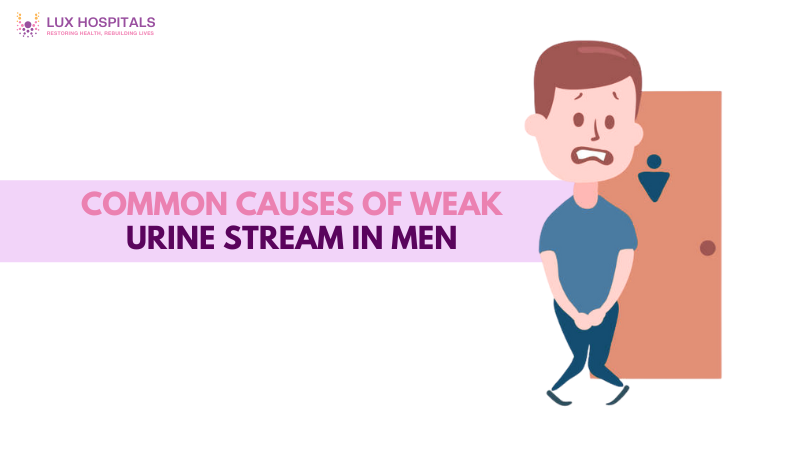Weak Urine Stream in Men: Causes and Treatments

Men’s weak urine streams can be unsettling and frequently indicate an underlying medical issue. Whether the symptom is a slow flow, trouble initiating, or a sense of incomplete emptying, it can impact everyday life and general well-being. Finding an effective treatment for men’s weak urine streams requires an understanding of its causes. This blog explores common reasons behind this problem and offers guidance on what men can do to address it.
Reasons for Weak Urine Stream in Men
1. Benign Prostatic Hyperplasia (BPH)
One of the most common causes of a weak urine stream in men is benign prostatic hyperplasia (BPH), or an enlarged prostate. The prostate gland may enlarge in males as they age. It also squeezes the urethra, restricting urine flow. Symptoms include difficulty starting urination, a dribbling stream, and frequent nighttime urination.
Treatment:
- Alpha-blockers to relax prostate muscles
- 5-alpha reductase inhibitors to shrink the gland
- Surgical options like TURP if medications fail
2. Urethral Stricture
A urethral stricture is a constriction of the urethra caused by scar tissue, infection, or injury. This narrowing reduces urine flow and often leads to a weak urine stream in men. Strictures can also cause pain during urination and frequent urinary tract infections (UTIs).
Treatment:
- Urethral dilation or surgical removal
- Urethroplasty for severe cases
- Regular monitoring for recurrence
3. Urinary Tract Infections (UTIs)
Although UTIs are more common in women, they can cause men to have weak urine streams. Infections cause inflammation and decreased flow by irritating the lining of the bladder and urethra. Pelvic pain, bad-smelling urine, and burning when urinating are possible further symptoms.
Treatment:
- Antibiotics to clear the infection
- Increased fluid intake
- Cranberry supplements for prevention
4. Prostatitis
Prostate inflammation, or prostatitis, can significantly impact a man’s urine flow. It may be caused by persistent pelvic pain syndrome or a bacterial infection. Urinating can be painful, frequent, and urgent for males.
Treatment:
- Antibiotics for bacterial infections
- Alpha-blockers for muscle relaxation
- Anti-inflammatory medications
5. Bladder Stones
Bladder stones develop when minerals in the bladder harden into small rocks. These stones can block the urinary tract and result in a weak urine stream in men. Blood in the urine may be one of the other signs, as may frequent urination and lower abdominal pain.
Treatment:
- Surgical removal via cystoscopy
- Drinking plenty of fluids to flush small stones
- Managing underlying causes like BPH
6. Neurological Conditions
Diseases such as Parkinson’s, multiple sclerosis, or Nerve signals from the brain to the bladder can be interfered with by spinal cord injury. Men who experience this disturbance may have weak pee streams and poor bladder control. It can occasionally lead to incontinence or urine retention.
Treatment:
- Intermittent catheterization
- Medications to relax bladder muscles
- Neuromodulation therapy
7. Bladder Muscle Weakness (Detrusor Underactivity)
When the detrusor muscle in the bladder wall becomes weak, it struggles to push out urine effectively. This condition often leads to a weak urine stream in men and a feeling of incomplete emptying. It may be caused by aging, diabetes, or long-term bladder obstruction.
Treatment:
- Scheduled voiding
- Catheterization
- Medication to stimulate bladder contractions
8. Diabetes
Diabetic cystopathy can result from long-term uncontrolled diabetes that damages the nerves that control the bladder. Men with this illness have a weak pee stream because their bladders do not empty. Urinary urgency and frequent urination are possible additional symptoms.
Treatment:
- Strict blood sugar control
- Bladder training exercises
- Possible use of the theatres
9. Medications and Lifestyle Factors
Certain drugs, such as decongestants, antidepressants, and antihistamines, may interfere with bladder function. Men who use these medications may have weak urine streams and urinary retention. Alcohol use or dehydration can also exacerbate symptoms.
Treatment:
- Review and adjust current medications
- Stay hydrated
- Avoid excessive caffeine or alcohol
When to See a Doctor?
You should see a doctor if you experience any of the following:
- A weak urine stream in men that persists or worsens
- Pain or burning sensation during urination
- Fever or chills along with urinary symptoms
- Blood in the urine (hematuria)
- Difficulty starting or maintaining urine flow
- A feeling of incomplete bladder emptying
Early diagnosis can help identify serious issues like blockages or cancer and improve treatment outcomes.
Conclusion
A weak urine stream in men is often a sign of an underlying medical condition that needs attention. Multiple factors could be at play, from prostate enlargement to nerve disorders. Recognizing the symptoms and seeking timely medical advice can improve the quality of life and prevent complications. If you’re experiencing a weak urine stream in men, don’t ignore it talk to a healthcare professional today.
Frequently Asked Questions
A weak urine stream in men can result from conditions like an enlarged prostate, urethral stricture, or urological disorders. It may also stem from infections or certain medications. Finding the root problem requires a proper diagnosis.
Treatment depends on the underlying cause of my weak urine stream. Options range from medication and lifestyle changes to surgery or catheterization. After a proper evaluation, a doctor can recommend the best treatment.
A weak urine stream in men can be a symptom of severe health conditions like prostate issues or bladder dysfunction. While not always dangerous, it should not be ignored. Prompt medical attention ensures better outcomes.
Drinking more water can help if a man's weak urine stream is due to dehydration or minor infections. However, it won’t resolve structural or neurological causes. It’s essential to consult a doctor for persistent issues.
Doctors may use a cystoscopy, digital rectal exam, urine flow test, or ultrasound to examine a weak urine stream in men. Urodynamic testing is another method for assessing bladder function. These tests help identify the underlying issue and guide treatment.





















